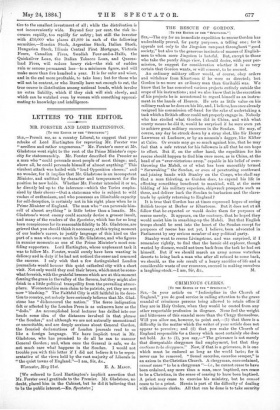THE RESCUE OF GORDON.
I To THE EDITOR OS THE " EIPECTATOE."1 SIR,—The cry for an immediate expedition to rescue Gordon has undoubtedly proved, for party purposes, a telling one ; for it appeals not only to the Jingoism rampant throughout " good society," but also to the generous instincts of masses of English- men to whom mere Jingoism is hateful. But, except to those who take the purely Jingo view, I should desire, with your per- mission, to suggest for consideration whether it is so very certain that Gordon wants, or will consent, to be rescued.
An ordinary military officer would, of course, obey orders and withdraw from Khartoum if he were so directed; but Gordon is no more an ordinary man than Garibaldi was. We know that he has conceived various projects entirely outside the scope of his instructions ; and we also know that in the execution of his projects he is accustomed to regard himself as an instru- ment in the hands of Heaven. He sets as little value on his military rank as he does on his life, and, I believe, has once already resigned his commission off-hand for the sake of undertaking a task which a British officer could not properly engage in. Nobody who has studied what Gordon did in China, and with what scanty means he did it, would be surprised if he were even yet to achieve great military successes in the Soudan. He may, of course, any day be struck down by a stray shot, like Sir Henry Lawrence at Lucknow, or by an assassin's dagger, like Kleber at Cairo. Or events may go so much against him, that he may feel that a safe retreat for his followers is all that he can hope to effect. But if, on the other hand, the expedition for his rescue should happen to find him once more, as in China, at the head of an "ever-victorious army," capable in his belief of over- throwing the Mandi, or of what has been uncouthly termed " Sarawaking " the Soudan, or even of penetrating southward and joining hands with Stanley on the Congo, who shall say that a man thirsting, as Gordon does, to expend his life in effecting something beneficent to mankind, will, at the mere bidding of his military superiors, shipwreck prospects such as these, and deliver back the Soudan to barbarism and the slave- trade by quietly returning to England P
It is true that Gordon has at times expressed hopes of seeing British troops at Berber or Khartoum. But it does not at all follow that he expected or would desire them for purposes of rescue merely. It appears, on the contrary, that he hoped they would assist him in smashing-up the Mandi. But that English troops should be sent into the heart of the Soudan except for purposes of rescue has not yet, I believe, been advocated in Parliament by any serious member of auy political party.
Stanley went to rescue Livingstone, and was surprised, if I remember rightly, to find that the heroic old explorer, though wasted by disease, would not turn back from the task he had set himself. But if we should march an army across waterless deserts to bring back a man who after all refused to come back, we should, as the sole result of a heavy sacrifice of life and a considerable waste of our resources, succeed in making ourselves a laughing-stock.—I am, Sir, eze., M.
































 Previous page
Previous page